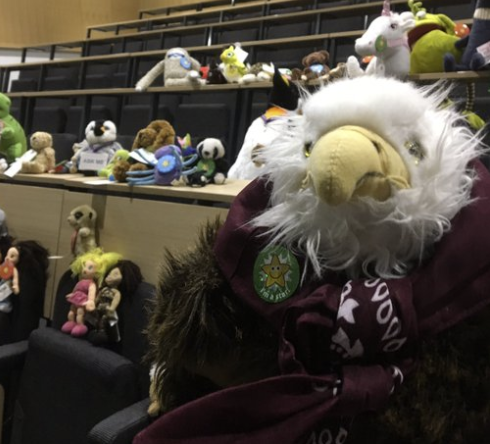Playful Learning Conference – Manchester 2017

Stephanie (Charlie) Farley – Open Education Resource Advisor for EDE .
A selfie with my fabulous audience – ready to tell all about my chase and snatch games #playlearn17 pic.twitter.com/BAh7UH1enR
— Prof. Prod Eagle II (@prod_eagle) July 12, 2017
Pitched at the intersection of learning and play for adults, the Playful Learning conference held at Manchester Metropolitan University is fast becoming a favourite for those of us who work with the more playful aspects of education.
In order to create a lusory attitude – a psychological willingness to accept the rules of a game to allow for a play experience – all delegates were advised to bring along a stuffed toy with their own Twitter account, toy challenges, and abductions. It was a great way to break the ice among delegates, and the toy backchannel on twitter was fabulous.
This year Gavin Willshaw ( Digital Curator, Library and University Collections) and I were at the conference to present the Playful Engagement strategy being created for our Information Services Group (ISG), and to demonstrate some of the playful engagement activities used across ISG including, 23 Things for Digital Knowledge, Metadata Games, Wiki-Editathons, Ada Lovelace Day. The workshop was well attended, with delegates interested in both the activities and how these could be applied in their own organisations, and also in the culture and strategy of playful engagement being encouraged across the University. (SlideShare: Playful Engagement across Information Services – links to activity documents available in Notes)
In a bold move, our opening keynote, Niki Woods, asked for all devices, laptops, phones, tablets, smart watches, etc., to be handed over and placed out of reach at the front of the room. Once all devices had been secured she shared with us stories of secrets and of events not viewed through the lens of a device, and encouraged us to reflect on how our experiences are changed, for better or worse, when we interact and share our experiences via a device. Interactions with technology continued as a theme throughout the conference with Virtual Reality choose your own adventures, interactive storytelling with videos, and bridging the gap from abstract to physical in design using 3D pens.
#playlearn17 Day 2 so many ideas! Lego Serious Play, Crys-Tel maze, 3D printing pens, #imagination #curiosity #play #pedagogy #innovation pic.twitter.com/2fnECf34NU — Danielle Ramsey (@DRamsey_PT) July 13, 2017
The second keynote, Associate Professor Rikke Toft Nørgård (Aarhus University, Denmark), raised that it is the attitude of play, a lusory state towards the world and others that is used in play, that is needed towards education rather than the activity of play itself. That playful attitudes towards experimentation, failure, and exploration can be utilised within a (serious) education space, and to do this we need to become reflective practitioners of playfulness first and reflective educators through playfulness second. Rikke, and colleagues Andrew Burn, John Potter, Nicola Whitton, and Alex Mosely, are running a project on ‘The playful university: Creating open-ended and playful universities’ using a Facebook group House of Game//Play as part of the Centre for Higher Education Futures. The slides from Rikke’s keynote can be found here- Keynote: The Signature of Playful Teaching and Learning?
Other highlights included:
The workshop ‘Playfully Hacking Society: a DIY Toolkit‘ with Helen Keegan (University of Salford) where we were encouraged to go out and interact with our environment and technologies in ways that pushed unspoken, and sometimes spoken, boundaries in order to explore citizenship and rights in urban and institutional environments.
The SOTL (Scholarship of Teaching and Learning) Research Design Game playtest with Eleanor Hannan (Manchester Metropolitan University). Eleanor designed the game to introduce students to the variety of research methods after she found her own introduction to the topic overly dry and complicated. Our group had a blast with the game and enjoyed the way it includes collaboration, reflection, creativity, and peer review!
Loving @EHannan14‘s #SOTLgame on research methods. AND it’s CC licensed! #PlayLearn17 pic.twitter.com/e5sDR1NiUr
— Charlie (@SFarley_Charlie) July 14, 2017



